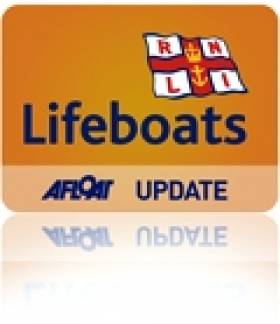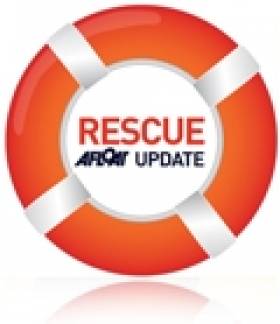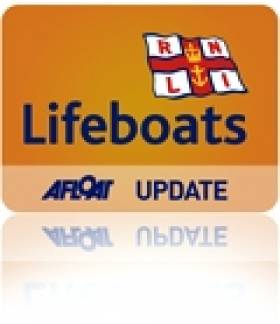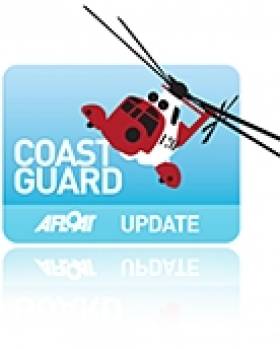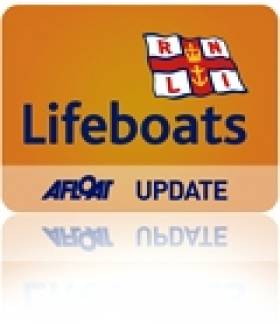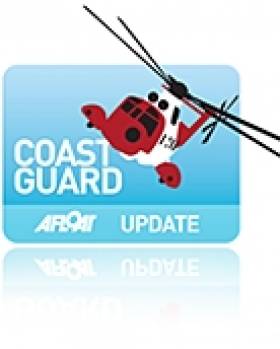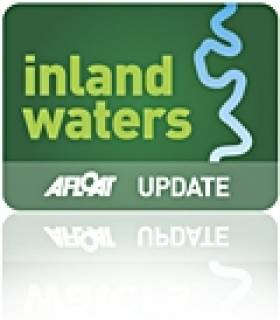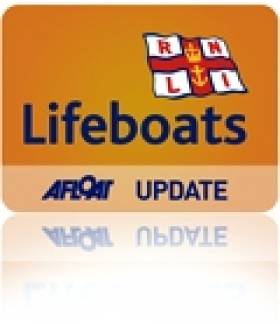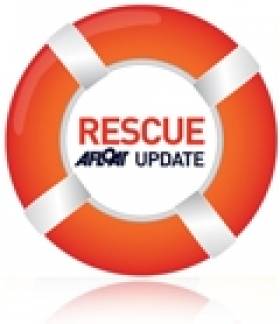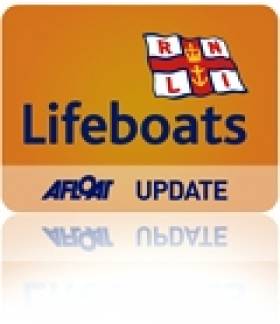Displaying items by tag: Rescue
Mayday Prompts Launch of Both Baltimore Lifeboats
Valentia Coast guard first raised the alert at 08:48 this morning requesting the launch of the all weather lifeboat Hilda Jarrett, 3 minutes later the inshore life boat Bessie was tasked too and with it's superior engine power was first on scene. They found the potting boat within 50 metres of the rocks at the North West point of the Western Calf Island. The fishermen had set an anchor in an attempt to keep the boat off the rocks, but the anchor had dragged and they were left holding into their pot lines for safety. A difficult task in Force 5 westerly winds with a 2 metre swell running.
Helm John Kearney manoevred the lifeboat into position and his crew threw a line to the fishermen. The lifeboat then towed the boat upwind and with the assistance of Schull inshore rescue removed the fishing boat from immediate danger.
The allweather lifeboat arrived on scene and stood by until it was clear that there was no further danger. The inshore lifeboat then towed the pot boat to the safety of Schull harbour. The fishermen were unharmed. Helm John Kearney commented ' it was fortunate we arrived when we did another 5 minutes and we would have been pulling the men out of the water'.
Inshore lifeboat Crew : Helm John Kearney, crew Ronan Callanan & Tadhg Collins
Allweather Lifeboat : Coxswain Kieran Cotter, crew Aidan Bushe, Jerry Smith, Cathal Cottrell, Anthony Sheehy, Sean Mc Carthy, Colin Whooley. Slip crew Rianne Smith, Simon Duggan, Gerard Sheehy
Five Escape When Yacht Hits Rocks Off Galway
Five sailors had a lucky escape when their yacht hit rocks off the coast of Galway in the early hours of Saturday morning, the Irish Examiner reports.
The crew of five, who had been taking part in the annual Around Aran Race, launched their liferaft when the boat ran aground and raise the alarm from the shore.
Galway's RNLI lifeboat was dispatched to the abandoned yacht in Galway Bay later that morning.
Wicklow Lifeboat Launches for Fishing Vessel
The lifeboat under the command of Coxswain Nick Keogh was quickly on scene and located the small fishing vessel drifting after engine failure , a towline was quickly passed and established , the fishing vessel with 3 crew was towed safely back to Wicklow harbour and was secured alongside the South Quay by 0910am. The lifeboat returned to Station and was ready for service again at 0945am.
This is the 5th callout this year for the busy station that was established in 1857.
Crew list - Coxswain Nick Keogh, Mechanic Brendan Copeland, Ciaran Doyle, Lisa O Leary, Brendan Kavanagh and Tommy Murphy.
Shore crew - John Sillery, John Hayden, Tommy Dover, John Docherty, Carol Flahive, Wayne Jones, Kevin Rahill, John Vize and Alan Goucher.
A German yacht took the yacht in tow, shadowed by a Turkish Coastguard boat into a safe bay at Kemile. Just after 3.00 pm the crew of the vessel was reported to be on dry land and all were safe and well.
Paul Harrison of Liverpool Coastguard says:
"It is unusual for a member of the public to call us about an incident off Turkey. In this situation we worked with our colleagues in Falmouth, who contacted the yacht's crew and the Turkish Coastguard. I am pleased to hear that the people involved are now safe and well.
"If you are going to charter a pleasure vessel abroad we would suggest that one of the first things that you should find out is who to call if you find yourself in an emergency situation. If you are in the UK you should either contact the Coastguard by calling 999 and asking for the Coastguard or marine VHF or MF radio."
Howth Lifeboat Assists Speedboat Captured on Video
On Sunday night, Howth Inshore Lifeboat assisted two people aground in a five metre speedboat North of Malahide estuary in Co. Dublin. Scroll down for the three minute RNLI video of the rescue.
In a joint operation in March, Howth Coast Guard and Howth lifeboat rescued a teenage girl who collapsed on Howth Head. The teenager had walked down a 100 foot steep cliff path to Jameson Beach on Howth Head with her friends when she collapsed. Gardai arrived on the scene and requested Coast Guard assistance to extract the casualty. Video and RNLI Video here.
Dublin Bay Mudflat Rescue Caught on Video
A Dubliner had a lucky escape after being stranded on mudflats between Baldoyle and Sutton Point, on Dublin Bay last week.
The man had sunk waist-deep in mud on a low tide and was unable to free himself. Dublin Fire Brigade was tasked to the scene along with the Howth Coast Guard unit. The Youtube clip of the entire incident is below.
Rescue helicopter 116, which was already on the ramp at Dublin Airport in preparation for a training exercise, was also tasked at 16.18pm according to a report on the the SAR Ireland blogspot.
After obtaining permission to cross the 'Live' runway at Dublin airport, R116 was on scene within minutes and quickly identified the man who was described as wearing 'dark clothing'. He was quickly winched to safety and returned to Dublin Airport at 16.36pm, where he availed of crew facilities to clean himself down and arrange transport home.
More on Dublin Bay here
60-foot Barge Sinks in Killaloe
Killaloe Coast Guard Unit was tasked to a 60' barge that was sinking at its mooring on Lough Derg on the inland waterways this afternoon. The Killaloe Coast Guard Unit dispatched two vehicles with crew and salvage pubs by road and the rescue boat "Dalton" was sent to place anti-pollution booms.
According to the Coastguard after many hours it was obvious that even with four pumps and a slurry tank the barge had sat on the bottom listing to starboard. A second slurry tank and the fire and rescue service from Nenagh also assisted.
11 Kayakers Rescued by Portrush Lifeboat
The callers stated that they could see a group of twelve kayakers in difficulty off Portballintrae, Causeway Coast, Northern Ireland.
Belfast Coastguard called out the Coleraine Coastguard Rescue Team and requested the launch of the Portrush RNLI lifeboats.
On arrival the Coleraine Coastguard Rescue team kept the kayakers under observation and directed the Portrush RNLI inshore lifeboat to the Kayakers. It was quickly established some of the group had become exhausted and suffering from sea sickness. Eleven of the group where transferred onto the large all weather Portrush Lifeboat whilst the Inshore Lifeboat escorted the one remaining kayaker back to Portballintrae Harbour.
The Portrush Lifeboat then transferred the eleven rescued kayakers who were mainly teenagers to the safety of Portrush Harbour.
Luckily none of the group required any medical attention.
Portrush lifeboat station adds:
Weather conditions were blustery and there was quite a swell off the coast. There was a North West wind coupled with a strong ebb tide. The tide was flowing against the wind, making conditions for the kayakers extremely difficult to return to shore. The Inshore Lifeboat (ILB) was launched first but it became clear the All-weather Lifeboat (ALB) was going to be needed to assist with the recovery of the party.
The ILB recovered 3 kayakers and returned them to Portballintrae. The ALB recovered the rest of the party and took them to Portrush Harbour.
The kayakers are safe and well, apart from suffering chronic sea sickness
Robin Cardwell Lifeboat Operations Manager said
'The fast response of the volunteer RNLI Lifeboat Crews from Portrush Station undoubtedly saved the lives of these kayakers. The sea and wind conditions made it virtually impossible for them to return to shore. Without the fast response of the crews at Portrush, this would have had a very different outcome'
Two Boys Rescued From Holyhead Harbour
Holyhead RNLI's lifeboat was dispatched on Tuesday morning to rescue two boys from a rocky outcrop just outside Holyhead harbour.
The boys, aged 13 and 14, had ventured out to Piebio Island, which is accessible at low tide, but quickly became stranded when the water rose.
After receiving a 999 call from the boys, Holyhead Coastguard tasked Holyhead RNLI with their recovery. The boys were soon retrieved and returned to school by the coastguard rescue team.
Holyhead Coastguard watch manager Barry Priddis urged anyone going to the coast over the Easter school holidays to make sure they keep aware of the tide times.
"We want everyone to enjoy their holidays at the coast and to go home safe," he said.
Wicklow Lifeboat Crew Race from Christening to Rescue
Both of the station lifeboats was launched and quickly located the kayakers South of Wicklow head , one man was taken on board the inshore lifeboat , he was then transferred onto the all-weather lifeboat and swiftly taken back to Wicklow harbour where he was met by a waiting ambulance crew and transferred to hospital for observation. The all-weather lifeboat then returned and picked up the other two men from the inshore lifeboat, they were landed safely in Wicklow harbour at 2-45pm and both lifeboats were stood down, allowing Coxswain Nick Keogh and David O Leary to re-join their families and resume the christening celebrations.
Lifeboat Operations manager Des Davitt said the 3 kayakers were well prepared and equipped with flares and vhf radio , 'they used their mobile marine VHF radio to contact the coast guard and ask for assistance, It meant our crew were able to respond quickly and bring them to safety'.
Related Safety posts
RNLI Lifeboats in Ireland
Safety News
Rescue News from RNLI Lifeboats in Ireland
Coast Guard News from Ireland
Water Safety News from Ireland
Marine Casualty Investigation Board News
Marine Warnings



























